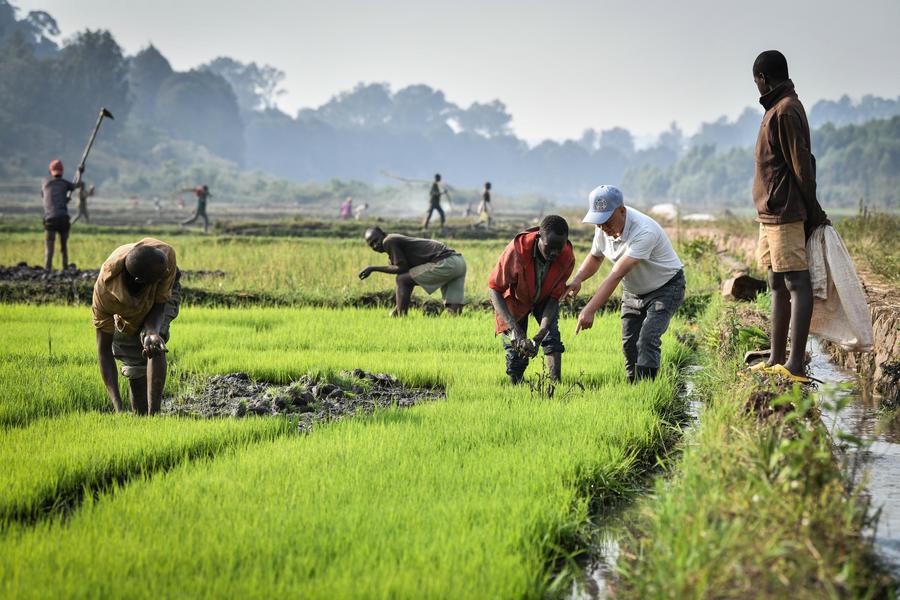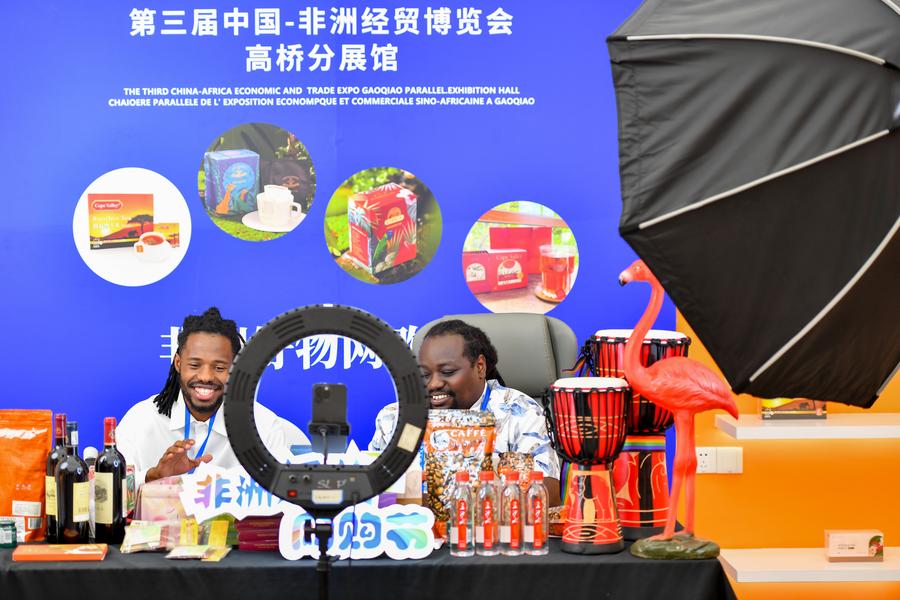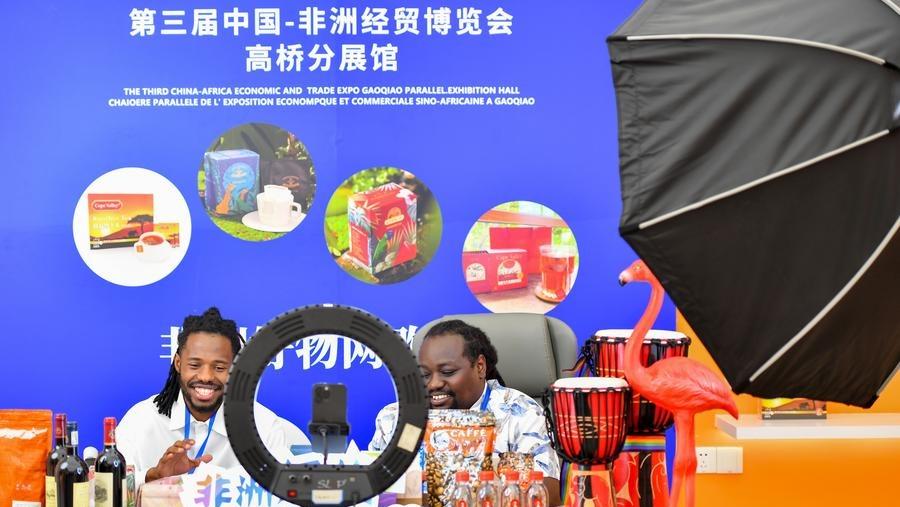In recent years, guided by the principles of sincerity, real results, amity, and good faith, China-Africa cooperation has increasingly advanced in quality and depth, extending into diverse areas such as industrialization, agricultural modernization, and green development in Africa, with win-win results.
SHANGHAI/NAIROBI, Sept. 1 (Xinhua) -- In August, the fields of Kenya's Mombasa hold new promise for food security as a new type of water-efficient and drought-resistant rice is being cultivated.
John Kimani, an expert from the Kenya Agricultural and Livestock Research Organization in charge of these fields, is enthusiastic about the potential of the new type of rice, developed by the Shanghai Agrobiological Gene Center (SAGC), to make a new contribution to the food security of his homeland.
In recent years, guided by the principles of sincerity, real results, amity, and good faith, China-Africa cooperation has increasingly advanced in quality and depth, extending into diverse areas such as industrialization, agricultural modernization, and green development in Africa, with win-win results.

HARVESTING HOPE FROM NEW RICE VARIETY
Technological limitations, inadequate agricultural infrastructure, and geopolitical tensions have long presented formidable obstacles for Africa in achieving food security. According to a United Nations (UN) report, nearly a quarter of Africa's population is facing food insecurity.
In response, many African countries have relied heavily on food imports to bridge this gap. Kenya, for example, faces a significant disparity between its domestic rice production and consumption, with over 80 percent of its rice being imported, putting heavy strains on the country's foreign exchange reserves, Kimani said.
The new rice variety, developed by a team led by Chief Scientist Luo Lijun from the SAGC, offers new hope for achieving "zero hunger" in Africa. Designed to conserve water and fertilizer while maintaining high and stable yields, it has already been promoted in over 10 African countries.
Seven years ago, Kimani introduced the new rice variety to Kenya and made adaptation trials.
"The trial results of the water-saving and drought-resistant rice are outstanding," Kimani told Xinhua during his recent visit to Shanghai, adding that the new rice can yield up to 7.5 tons per hectare, more than doubling the output of traditional Kenyan varieties.
With the excellent output performance, the new rice variety is expected to be approved in Kenya this year and enter the local market for promotion.
According to the SAGC, new rice varieties have already gained approval from local governments in Uganda, Burundi, and Burkina Faso, and local farmers have shown enthusiasm about them.
In recent years, the spirit of China-Africa agricultural cooperation has been characterized by vigor and mutual support. Initiatives including technical assistance, technology transfer, and agricultural park development have yielded significant outcomes. These efforts have not only enriched the dietary diversity of African communities but also promoted agricultural modernization on the continent.

IMMENSE POTENTIAL BRINGS BIG OPPORTUNITIES
Agricultural collaboration epitomizes the mutual assistance between China and Africa. Trade between China and Africa since 2000 has seen unparalleled growth, compared with Africa's other trading partners.
The relationship with China has already contributed to African growth. China recognizes the vast untapped potential in Africa for further progress and advancement, and in turn, Africa regards China as a paragon of economic and social development.
Ni Guohua, chairman of the Shanghai Dragon Corporation, is fully aware of the African market's enormous potential. THREEGUN, a renowned Chinese clothing brand under the Shanghai Dragon Corporation with a legacy spanning more than 80 years, has expanded its global footprint by launching a new fashion line designed for women in Kenya that blends Chinese design with a local style.
At the end of 2023, the Shanghai Dragon Corporation dispatched its inaugural shipment of 20,000 units to Nairobi, targeting the mid-to-high-end consumer group in Kenya.
The market reception has been impressive, with nearly half of the inventory already sold, said Ni. Renowned for its quality, exquisite design, and competitive pricing, THREEGUN has garnered favorable reviews from local consumers, especially among the business community.
"Kenya, and Africa as a whole, are experiencing continuous economic growth," Ni said. "I am confident that there is substantial potential for market growth in the future. We intend to further strengthen our ties with local African partners." He is optimistic that their collaboration will evolve over time, potentially leading to the local production of finished garments.
This exemplifies China-Africa cooperation as a mutually beneficial endeavor, not only enriching macroeconomic narratives but also enhancing people's lives.
With the acceleration of urbanization and the development of a consumer economy, Africa is no longer just a destination for Chinese infrastructure companies to go overseas, as enterprises in the consumer and digital economy sectors are also entering the continent.
The African Development Bank Group's "African Economic Outlook 2024" report predicts that the average growth rate of African countries in 2024 will reach 3.7 percent, and 4.3 percent in 2025. As an important part of the African consumer market, the garment industry is facing unprecedented development opportunities.
The market potential is self-evident. Chinese companies going overseas to Africa are not only exploring markets but also providing support for local industrialization and urbanization, achieving mutual benefits.
"The economic potential growth in Africa is immense, and China's potential contribution is equally immense, which is why I am convinced that this collaboration will yield long-term benefits for a brighter future for both sides," Amine Hammadi, chief Analyst for the African Chamber of Commerce said.

ADVANCING TOWARD A SHARED FUTURE
The latest session of the Forum on China-Africa Cooperation (FOCAC) is due to take place in Beijing in early September with the theme "Joining Hands to Advance Modernization and Build a High-Level China-Africa Community with a Shared Future."
"The interesting point about the theme is that China does not look down on Africa, but instead prefers to go side by side joining hands to have mutual development and share benefits," Hammadi said. "To encapsulate Sino-African cooperation in three keywords, I would select strong, consistent, and mutually beneficial."
Hammadi believes that China's experience in modernization and development, particularly through the Belt and Road Initiative, which encompasses infrastructure and connectivity, offers invaluable insight into Africa. China's vanguard position in new technologies and green energy presents a wealth of opportunities for African countries to draw upon. Additionally, China's commitment to expanding skill development programs addresses a critical need for Africa's youthful and economically vibrant populace.
Looking ahead, Sarah Baynton-Glen, an Africa Economist at the Standard Chartered Bank, sees opportunities for greater cooperation in manufacturing and value-addition in Africa, with China's support and expertise.
Josef Gregory Mahoney, a professor at East China Normal University, contrasts the Western development paradigm, which has historically marginalized Africa, with the Chinese model that emphasizes dignity, self-respect, security, and sustainable, green innovation.
Mahoney said that China recognizes the importance of win-win development as a means for nations to independently overcome their challenges while collectively reaping the benefits of peace. Consequently, he concludes, China-Africa cooperation is flourishing, and so are Africa's prospects. Enditem
(You Zhixin, Yu Shuaishuai, Zhang Mengjie and Zhao Yihe in Shanghai, and Li Hualing, Lin Jing, Li Zhuoqun and Naftali Mwaura in Nairobi contributed to the story.)




 A single purchase
A single purchase









